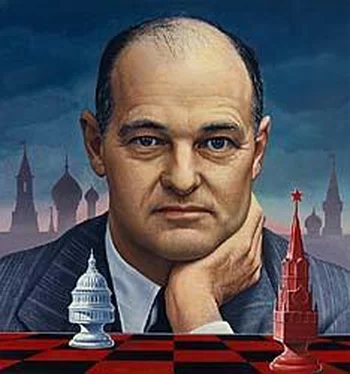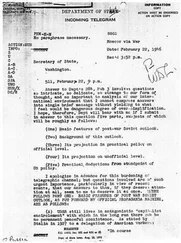In the light of the above, it will be clearly seen that the Soviet pressure against the free institutions of the western world is something that can be contained by the adroit and vigilant application of counter-force at a series of constantly shifting geographical and political points, corresponding to the shifts and maneuvers of Soviet policy, but which cannot be charmed or talked out of existence. The Russians look forward to a duel of infinite duration, and they see that already they have scored great successes. It must be borne in mind that there was a time when the Communist Party represented far more of a minority in the sphere of Russian national life than Soviet power today represents in the world community.
But if the ideology convinces the rulers of Russia that truth is on their side and they they can therefore afford to wait, those of us on whom that ideology has no claim are free to examine objectively the validity of that premise. The Soviet thesis not only implies complete lack of control by the west over its own economic destiny, it likewise assumes Russian unity, discipline and patience over an infinite period. Let us bring this apocalyptic vision down to earth, and suppose that the western world finds the strength and resourcefulness to contain Soviet power over a period of ten to fifteen years. What does that spell for Russia itself?
The Soviet leaders, taking advantage of the contributions of modern techniques to the arts of despotism, have solved the question of obedience within the confines of their power. Few challenge their authority; and even those who do are unable to make that challenge valid as against the organs of suppression of the state.
The Kremlin has also proved able to accomplish its purpose of building up Russia, regardless of the interests of the inhabitants, and industrial foundation of heavy metallurgy, which is, to be sure, not yet complete but which is nevertheless continuing to grow and is approaching those of the other major industrial countries. All of this, however, both the maintenance of internal political security and the building of heavy industry, has been carried out at a terrible cost in human life and in human hopes and energies. It has necessitated the use of forced labor on a scale unprecedented in modern times under conditions of peace. It has involved the neglect or abuse of other phases of Soviet economic life, particularly agriculture, consumers’ goods production, housing and transportation.
To all that, the war has added its tremendous toll of destruction, death and human exhaustion. In consequence of this, we have in Russia today a population which is physically and spiritually tired. The mass of the people are disillusioned, skeptical and no longer as accessible as they once were to the magical attraction which Soviet power still radiates to its followers abroad. The avidity with which people seized upon the slight respite accorded to the Church for tactical reasons during the war was eloquent testimony to the fact that their capacity for faith and devotion found little expression in the purposes of the regime.
In these circumstances, there are limits to the physical and nervous strength of people themselves. These limits are absolute ones, and are binding even for the cruelest dictatorship, because beyond them people cannot be driven. The forced labor camps and the other agencies of constraint provide temporary means of compelling people to work longer hours than their own volition or mere economic pressure would dictate; but if people survive them at all they become old before their time and must be considered as human casualties to the demands of dictatorship. In either case their best powers are no longer available to society and can no longer be enlisted in the service of the state.
Here only the younger generations can help. The younger generation, despite all vicissitudes and sufferings, is numerous and vigorous; and the Russians are a talented people. But it still remains to be seen what will be the effects on mature performance of the abnormal emotional strains of childhood which Soviet dictatorship created and which were enormously increased by the war. Such things as normal security and placidity of home environment have practically ceased to exist in the Soviet Union outside of the most remote farms and villages. And observers are not yet sure whether that is not going to leave its mark on the over-all capacity of the generation now coming into maturity.
In addition to this, we have the fact that Soviet economic development, while it can list certain formidable achievements, has been precariously spotty and uneven. Russian Communists who speak of the “uneven development of capitalism” should blush at the contemplation of their own national economy. Here certain branches of economic life, such as the metallurgical and machine industries, have been pushed out of all proportion to other sectors of economy. Here is a nation striving to become in a short period one of the great industrial nations of the world while it still has no highway network worthy of the name and only a relatively primitive network of railways. Much has been done to increase efficiency of labor and to teach primitive peasants something about the operation of machines. But maintenance is still a crying deficiency of all Soviet economy. Construction is hasty and poor in quality. Depreciation must be enormous. And in vast sectors of economic life it has not yet been possible to instill into labor anything like that general culture of production and technical self-respect which characterizes the skilled worker of the west.
It is difficult to see how these deficiencies can be corrected at an early date by a tired and dispirited population working largely under the shadow of fear and compulsion. And as long as they are not overcome, Russia will remain economically as vulnerable, and in a certain sense an impotent, nation, capable of exporting its enthusiasms and of radiating the strange charm of its primitive political vitality but unable to back up those articles of export by the real evidences of material power and prosperity.
Meanwhile, a great uncertainty hangs over the political life of the Soviet Union. That is the uncertainty involved in the transfer of power from one individual or group of individuals to others.
This is, of course, outstandingly the problem of the personal position of Stalin. We must remember that his succession to Lenin’s pinnacle of pre-eminence in the Communist movement was the only such transfer of individual authority which the Soviet Union has experienced. That transfer took 12 years to consolidate. It cost the lives of millions of people and shook the state to its foundations. The attendant tremors were felt all through the international revolutionary movement, to the disadvantage of the Kremlin itself.
It is always possible that another transfer of pre-eminent power may take place quietly and inconspicuously, with no repercussions anywhere. But again, it is possible that the questions involved may unleash, to use some of Lenin’s words, one of those “incredibly swift transitions” from “delicate deceit” to “wild violence” which characterize Russian history, and may shake Soviet power to its foundations.
But this is not only a question of Stalin himself. There has been, since 1938, a dangerous congealment of political life in the higher circles of Soviet power. The All-Union Congress of Soviets, in theory the supreme body of the Party, is supposed to meet not less often than once in three years. It will soon be eight full years since its last meeting. During this period membership in the Party has numerically doubled. Party mortality during the war was enormous; and today well over half of the Party members are persons who have entered since the last Party congress was held. meanwhile, the same small group of men has carried on at the top through an amazing series of national vicissitudes. Surely there is some reason why the experiences of the war brought basic political changes to every one of the great governments of the west. Surely the causes of that phenomenon are basic enough to be present somewhere in the obscurity of Soviet political life, as well. And yet no recognition has been given to these causes in Russia.
Читать дальше



![Джеймс Купер - Пионеры, или У истоков Саскуиханны [The Pioneers, or The sources of the Susquehannah]](/books/395797/dzhejms-kuper-pionery-ili-u-istokov-saskuihanny-t-thumb.webp)








